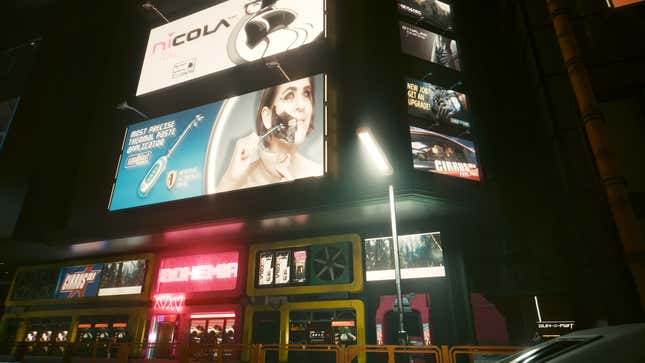Tech
An Ode to When PlayStation Ads Were Completely Unhinged

We’re encroaching on 25 years since Sony first unveiled the PlayStation 2, yet current-day PS5 owners don’t have much to be excited about in 2024. We’re on the short road to the expected release of the PlayStation 5 Pro. Despite it likely being the company’s biggest hardware release of the last four years, you wouldn’t know it judging by that dull affair that was its State of Play game showcase this past month.
After watching Nintendo mop the floor with Microsoft and Sony with its most recent Direct game showcase, I’m stuck staring at my old Nintendo Switch, which sits at home on top of my ancient PlayStation 2. Because as dry, humorless, and corporate Sony is today, I’m again reminded how far the same company was once willing to market its gaming gear. There was a time a quarter of a century ago, between 1997 and 2001, when Sony wanted its PlayStation to be the grungiest, most obscene console you could buy.
It was a better age when we could all sit back and laugh at a company’s attempts to sell to our worst instincts, itself a real-life satire that somehow doubles back and becomes an anti-satire. Sony isn’t winning much right now, and remembering some of these old ads, we might be able to see why.
Just How Deranged Were PlayStation’s Old Ads?
This came to mind last week when I spotted an obscene, though entirely fake, PlayStation ad. Occasionally, a fake PlayStation ad surfaces at the top of the feeds. It’s an image of a young woman with her tongue out, four pills sprinkled along her taste buds. Each pill is embedded with the triangle, X, circle, and square buttons, which are indicative of the PlayStation controls. It’s not real. It’s so close to the actual print and TV ads greenlit by the same brand that it hardly matters that it’s fake.
Every time it comes up, folks need to remind each other it’s just some conjured image surfaced on a tide from the internet’s perpetually backed-up sewers. Would Sony have honestly promoted a message that says, “Games are drugs, and drugs are cool?” Yes, it absolutely would have, especially when you consider ads where the PlayStation’s face buttons were shown bloodily etched into a man’s sclera or attached to people’s nipples.
Remember how out of left field Apple’s 1984 ad was? That was directed by famed director Ridley Scott, a man who returned to ads to help PlayStation promote the PS2 and, perhaps, that games are a form of disillusioned counterculture, even when each disc costs $40 to $60 a pop.
But somehow, Scott couldn’t match up to just how weird the infamous 1999 ad “Mental Wealth” involved a young Scottish woman in pigtails and eyes that seemed inhuman. The ad, directed by Chris Cunningham, spawned so much confusion that some viewers honestly thought that the actress in the ad, Fiona Maclaine, truly had eyes spaced to the far ends of her face.
Even after Sony left behind its grunge era, the company was still known for poor taste. Sony has previously apologized for promoting an obviously racist ad for the PSP that ran in the Netherlands in 2006. The unhinged advertising is what arguably helped give credence to unauthorized ads that involved blood transfusions for Nazis and a man with a thumb in place of his genitals. Sony had to spend time and energy denouncing those two ads as foreign, unauthorized promotions.
In the PS3 era, we were greeted with less sexualized ads. Yet they still had a raw edge that felt like they still mangled the message but kept players’ attention–which I assume is their whole point. The infamous 2006 Baby Doll ad said practically nothing about the console. It didn’t expressly make anyone want to go out and buy one. But hell, even as a pre-teen, every time I looked at a baby doll (more often than most, I guess), I saw a PS3.
We May Have Been Better Off With Self-Satirical Ads
The most recent PlayStation State of Play was the same, corporate stream-a-thon where expectant players are meant to watch through dozens of trailers for games they’ll never play, hoping to catch a glimpse of a game that never shows. This past month’s Summer Games Fest and Xbox Showcase were similarly dry affairs, devoid of the ramshackle explosive spontaneity of past E3s. RIP.
That doesn’t mean we’re in a worse place because Sony’s marketing has left its rebellious phase. Ads are, by their nature, abusive. They’re psychologically manipulative and misleading and are a great distraction from the everyday calamity that is the very existence of multi-billion dollar corporations.
What I enjoyed about Sony’s old marketing is how ineffectual it was; it was a reminder of the gross excess of marketing in the first place. The PlayStation ads of yesteryear most resemble the satirical advertisements found in games like Grand Theft Auto: V and Cyberpunk 2077.
I’m doing a new playthrough of Cyberpunk. Now that the game is fully stable, I can truly appreciate how much time and attention is paid to the human elements of our main cast of characters compared to the awful, inhuman, sex-obsessed world they inhabit. Everywhere you go, you’re bombarded with over-the-top ads for fake beef, cocaine analogs, thermal paste toothbrushes, sex shops, and other Times Square-sized billboards for things you most certainly would never want to buy.

In that way, the ads are cathartic. They were so ridiculous we were given the range to laugh or sneer at them. But in that same breath, the ads were effective. We’re still talking about them, after all. Sony has remained one of the biggest game console makers for a reason. Sony didn’t need to sell you a console in these commercials. It didn’t even sell you some “counterculture” identity. It sold you on allowing its ads to occupy your attention.
But I still believe they were better than what we have now. Gamers had a shared sense of community, even if it was to let us all laugh at a corporation’s attempts to feign counterculture. Back then, games felt like an up-and-comer, a new art-sharing medium. Today, most big-budget games feel the same, sanded down so there are no more rough edges. It makes it easier for them to close game studios, fire thousands of developers, and cancel anticipated projects.







:max_bytes(150000):strip_icc()/roundup-writereditor-loved-deals-tout-f5de51f85de145b2b1eb99cdb7b6cb84.jpg)


